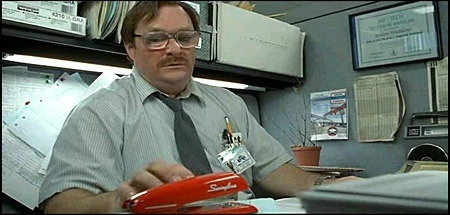So what would you say….you do here?
If you haven’t listened to the latest Scriptnotes podcast (ep. 84) hosted at johnaugust.com, there’s a piece of conversation that takes place between the 25 and 35 minute marks that sheds some good insight into the “funny on page vs funny on screen” dilemma. Even if you don’t enjoy their particular brands of humor, co-hosts John August and Craig Mazin know quite a bit about what goes into creating marketable comedy.
In the episode, they express their agreement on how rare it is to laugh while reading a script. Seldom do words on paper elicit the type of response they will ultimately go on to elicit when manifested on screen. In a sense, script jokes aren’t even meant to be funny on paper; they’re merely ingredients for the director and actors to make something funny happen. This is something I’ve been thinking about lately while studying all the latest successful comedies as preparation to write my screenplay. 90% of the what has made me laugh on screen these past few weeks would never have seemed nearly as funny to me on paper.
Why is this important to know? If you’re a fledgling writer and you show your comedy script to inexperienced readers, you are going to receive a lot of negative feedback along the lines of “Where are the jokes?”, “This isn’t funny.”, etc. It could very well be that you have failed to create a funny script, but you must also consider the possibility that your readers simply lack the imagination and experience to envision how your dialogue will sound coming out the mouth of Paul Rudd, the power of a single facial expression worn by Zach Galifinakis, or how a gag will play out between two masters of physical comedy.
I submit the following rule of thumb: never show your comedy script to someone who doesn’t understand the above. Their feedback will only hurt your confidence, serve as a negative reflection of your work, and ultimately lead you astray.





